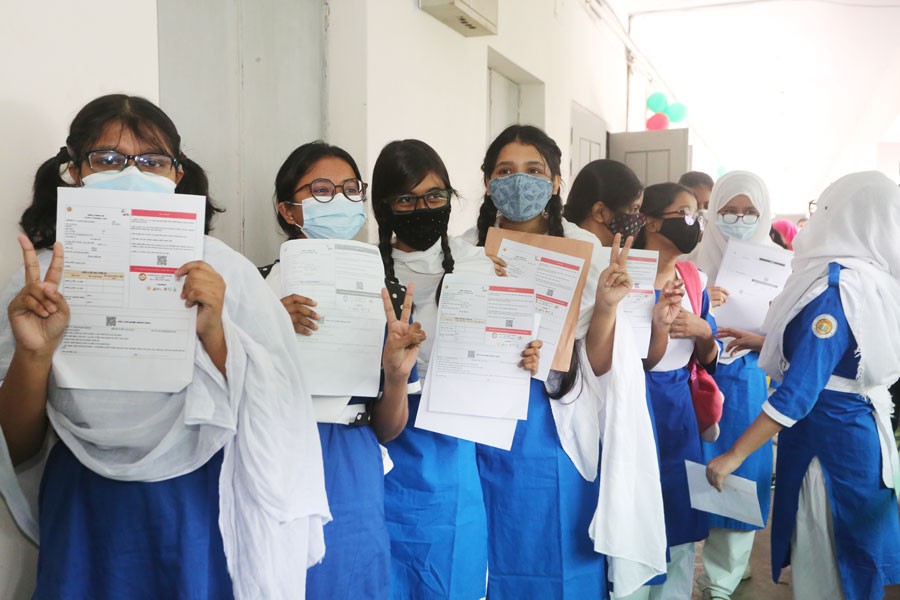
Published :
Updated :

The national budget for the fiscal year 2022-23 (FY23) will be critical to chart the recovery of the education sector that has suffered the adverse impacts of the pandemic manifested through the digital divide, learning loss, dropout, and child marriage, among other factors. The protracted school closure of 61 weeks disrupted the education of about 31 million children and resulted in learning loss due to reduced participation for many. Although the country has stepped into the third year of the pandemic, there is still no official estimate on the impact of the Covid-19 crisis on the education sector. However, looking at the various studies undertaken by research organisations, think-tanks, and development partners, one can get an idea about how the education sector has been affected.
DIGITAL DIVIDE: Despite the measures taken to continue learning through online classes, lack of access to digital devices and the internet has been a challenge for many students, creating a digital divide. A BRAC study revealed that 56 per cent of the surveyed students could not participate in online lessons. This non-participation was more evident among students of ethnic minorities (75 per cent), and those living in rural areas (60 per cent). Although no official data is available on how many students could not take part in online lessons across the country, the findings mentioned above are alarming, indicating the most disadvantageous population are likely to be left out of online education.
DROPOUT: Even before the pandemic, the dropout rate for primary and upper secondary levels was 34.8 per cent and 19.6 per cent respectively; the dropout rate was the highest in secondary education (37.6 per cent). With the onset of the pandemic containment measures, about 45 per cent of students are likely to have dropped out of secondary school to either support their families in earning or to lessen the economic burden, as suggested by one World Bank study.
CHILD MARRIAGE: Prolonged school closure could have resulted in a spike in child marriage, impacting the girl students most. A report by Manusher Jonno Foundation, UNFPA, Unicef and Plan International Bangladesh revealed that between April-October 2020, at least 13,886 girls from 84 Upazilas of 21 districts were forced into child marriage.
In addition to these factors, the disruption in education at all levels is likely to hamper the students' competency across the lifecycle, hindering their current and future job market participation.
Given this alarming situation, there is a serious need to go beyond the business-as-usual allocation for the education sector in the national budget. The current FY22 education budget is only about 2 per cent of Gross Domestic Product (GDP) and less than 12 per cent of the total national budget. The education budget as a percentage of the national budget has been hovering between 9 to 11 per cent. As a percentage of GDP, the allocation for education sector has been between 1.87 and 2.21 per cent for almost the last seven years, while the country's 8th Five-Year Plan (8FYP) sets the target to increase allocation to 3.5 per cent by 2025.
The FY23 budget should, therefore, have a clear direction on how the education sector will be supported to recover from the pandemic-induced challenges. There should be a significant increase in the allocation which should then be supported by recovery initiatives.
The recovery initiatives should include a proper assessment of the condition of the education sector and then a formulation of a strategy categorising the interventions into short, medium and long-term measures.
The government now has a good database of millions of students' mothers who receive the stipend money through the digital payment system. One strategy could be utilising this database to identify the affected students and families. Affected families with dropped out students could be incentivised to bring back students to the school.
The capacity to implement the proposed allocation and promised measures should be improved. For instance, the FY22 budget had plans for a new school meal project in July last year and provision of supporting each student with Tk1,000 with "kit allowance" to help them buy a dress, a pair of shoes and a bag. However, the new school meal project was cancelled, and the kit allowance is yet to commence operation. Hence, the capacity to deliver the promises made in the budget is questioned. This practice has to change. Given the challenge, it would be prudent to utilise the vast network of NGOs spread out across the country. A proactive government-NGO collaboration can help address such challenges.
To counter the spillover effect of the Covid-triggered disruption into the job market, there should be suitable initiatives that address the labour market needs in the post-pandemic situation. Mainstreaming technical and vocational education has been emphasised for a long time and should be brought under the spotlight by integrating classroom teaching with industry experience. How such initiatives can be incentivised should be explored and acted upon.
There should be specific allocations to build the capacity of the teachers also. Such capacity-building initiatives should be undertaken based on proper need assessment of the teachers which may vary across primary, secondary, and tertiary levels.
In fine, the education budget for FY23 should go beyond the traditional allocation mechanism and introduce data-driven and out-of-the-box initiatives to recover from the pandemic-induced bottlenecks.
Dr M Abu Eusuf, Professor, Department of Development Studies and Director, Centre on Budget and Policy, University of Dhaka & Executive Director, Research and Policy Integration for Development (RAPID).
eusuf101@gmail.com


 For all latest news, follow The Financial Express Google News channel.
For all latest news, follow The Financial Express Google News channel.